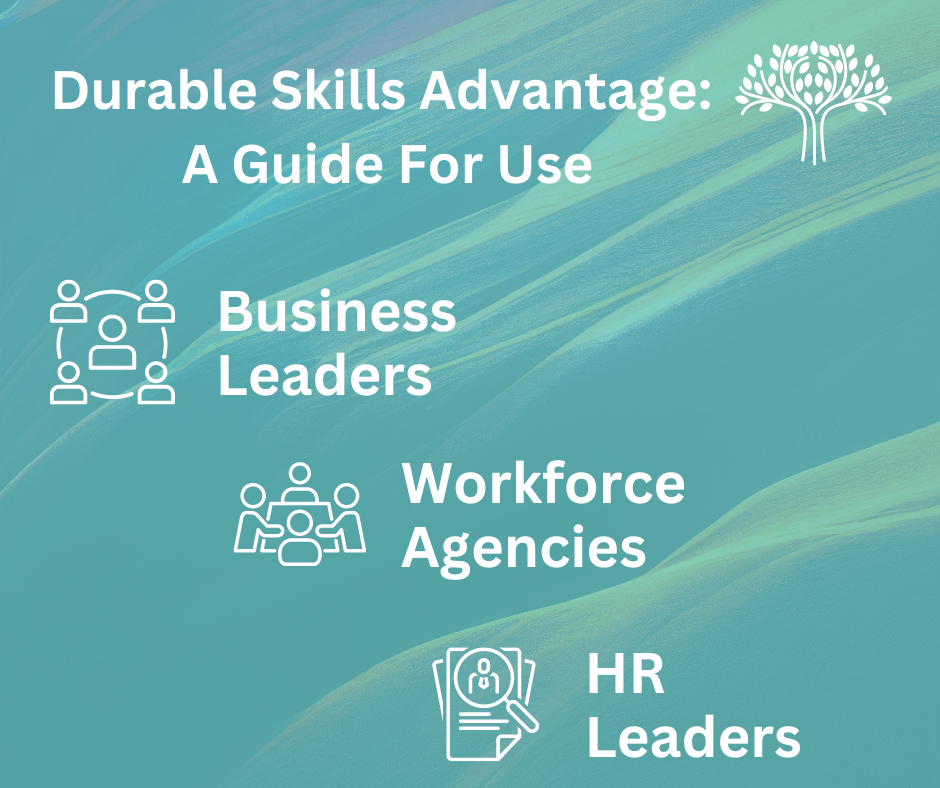An analysis of more than 80 million job postings from 2020-2021 showed that Durable Skills serve as a linchpin to workforce success, transcending educational attainment level, industry sector, or geography. However, uncertainty about what these skills really are, how they can be analyzed, and why they matter persists. To bridge this gap, we developed the Durable Skills Advantage Framework.
Continue reading to learn how workforce agencies, business leaders, and Human Resources professionals could leverage this Framework.
Durable Skills in the Workplace
Durable Skills, such as collaboration, communication, and critical thinking, are essential for success in professional settings. With a staggering 85% of job success dependent on Durable Skills, they enable people to thrive across all jobs and industries. These skills remain relevant and valuable, making them highly sought after by employers. However, businesses have continued to face a challenge of identifying and nurturing these competencies in an equitable way.
Our Durable Skills Advantage Framework aims to address this economic need by reshaping talent development strategies and setting up employees for long-term business success. Created by over 800 stakeholders, ranging from business leaders to young professionals, our Framework represents a forward-thinking approach to workforce development, one that is aligned with the evolving needs of today’s industries. Implementing the Framework into workforce development practices offers widespread benefits to individuals, organizations, and the economy.
For Workforce Agencies
Skill-based Hiring: Use the detailed definitions and performance levels within the Framework to create a skills-based matching database that aligns job requirements with proficiency levels of job seekers at the state and federal levels. This not only streamlines the hiring process, but also ensures a more comprehensive evaluation of candidates that focuses on nuanced skills sets.
Enhance Employability: Identify patterns in Durable Skill gaps among job seekers and partner with training and upskilling programs aligned with the Framework to get these skills to job seekers. These programs would address the specific needs of job seekers while also increasing the pool of well-matched candidates, therefore enhancing employability on a broader scale.
For Business Leaders
Increase Retention Rates: Embracing the Framework sends a clear message from leaders, acknowledging the pivotal role diverse skills and perspectives play in organizations. This not only attracts individuals with strong Durable Skills, but creates a workplace where employees feel valued and motivated. Employers can further create upskilling and professional development opportunities, encouraging employees to commit to and grow within their organizations.
Drive Growth Through Inclusion: Implementing the Framework into talent development strategies can build a more inclusive culture by not restricting opportunities based on traditional markers of success, such as bachelors degrees, and instead focusing on the nurturing of a diverse range of skills and perspectives. This can foster a culture where collaboration, innovation, and collective growth thrive.
For HR Professionals
Standardize Job Postings: Apply the Framework to clearly define the Durable Skills required for a particular role, ensuring consistency and transparency of the expectations from potential candidates. This can be especially helpful in larger organizations with robust talent recruitment teams. When all of your recruiters are using the same definitions for Durable Skills, they can more easily work together to place each candidate in a role that best suits them.
Identify the Right Candidates: Articulate the job requirements using the Framework’s language to foster a mutual understanding between candidates and HR professionals, reducing ambiguity and motivating applicants with the needed skill set to apply for the position.
Join Us In Reshaping the Future of Workforce Development
In today’s rapidly changing job landscape, investing in Durable Skills can foster pathways to economic mobility, a resilient workforce, stronger talent pipelines and economic growth. We encourage workforce development stakeholders to leverage the Durable Skills Advantage Framework to build teams capable of navigating modern challenges while ensuring diverse skill sets are recognized and valued.




